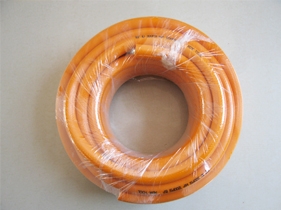
Harbin Oil resistant hose It is mainly used for the transportation of liquid and gas. The use requirements of cloth clip sand blasting pipe are stricter than those of ordinary rubber hose. The so-called high voltage puts forward this requirement. The following small series will introduce the use requirements of cloth clip sandblasting pipe. According to the use characteristics of cloth clip sand blasting pipe, the larger working pressure of cloth clip sand blasting pipe is determined according to the system pressure. Each cloth clamping sand blasting pipe has a normal working pressure, and the bursting pressure of cloth clamping sand blasting pipe is 3-4 times of the larger working pressure. The higher the pressure, the higher the number of steel wire layers, and the more stringent the product production. Therefore, according to the actual pressure of the system, the higher the working pressure of the cloth clamping sand blasting pipe, the normal operation of the system can be ensured, and the appropriate cloth clamping sand blasting pipe can be selected. If the impact pressure of the system is frequent, the cloth clip sandblasting pipe with high pulse life shall be selected, and the specification and model classification of the cloth clip sandblasting pipe shall be properly improved. Temperature is also one of the factors considered by customers. Oil resistant hose Where can I find it? The high and low temperature transition in the working environment will affect the service life and pressure bearing capacity of the rubber hose. Therefore, high-pressure rubber hoses should be used within their allowable range. For the system whose long-term operating temperature is not within its allowable range, hose sheath or special rubber hose shall be purchased.
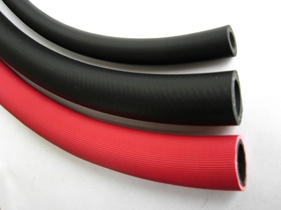
Due to the limitation of spatial location conditions, high quality Oil resistant hose The installation stress of can often bring various difficulties to the installation work: formed pipes cannot be installed; When you bend down, you are about to come. If you make do with pipes, local cold correction will inevitably occur. According to the size of the pipeline and the specific situation on site, the cold correction amount varies from several millimeters to tens of millimeters, some as high as hundreds of millimeters. Practice has proved that the greater the quantity, the higher the internal stress. These residual installation stresses in the rubber sand blasting pipe are undoubtedly huge hidden information. The lubricating oil duct of a certain type of engine bearing was broken for many times due to excessive installation stress in actual operation. Because it can be bent at will, the internal stress generated by bending under the condition of rated bending radius is very small, which brings great convenience to the installation work, and also plays a certain role in ensuring the safe operation of the rubber sand blasting pipe. This is the main reason why some rubber sand blasting pipes must be used. Since it is necessary to load and unload the mold, the movable cylinder on the vulcanizer will move up and down. After repeated reciprocation, the copper serpentine tube will undergo fatigue fracture. Although it can continue to be used after repair, stopping for repair will cause time loss. Harbin Oil resistant hose Although it has good flexibility and strong fatigue resistance, it is also weak in pressure bearing, temperature resistance, aging resistance and other aspects, and can not be used after several months. The good comprehensive performance of rubber sand blasting pipe is fully reflected here.
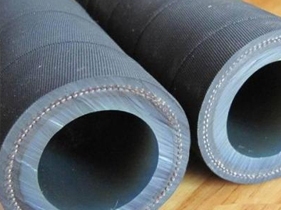
Harbin Oil resistant hose Also called rubber hose for sand blasting. It is suitable for air pressure sand blasting of metal surface for rust removal, hemp removal, and sand blasting rubber hose for wet sand blasting and dry sand blasting in engineering construction. It is suitable for air pressure sand blasting of metal surface for rust removal, hemp removal, and sand blasting rubber hose for wet sand blasting and dry sand blasting in engineering construction. The common application fields are shipbuilding, machining, spraying industry, etc. Appearance of abrasion resistant sand blasting rubber hose: 1. Light abrasion resistant sand blasting rubber hose consists of black, yellowish or transparent abrasion resistant rubber inner layer, central fabric or cord reinforcement layer, medium rubber layer and outer rubber layer; 2. Heavy abrasion resistant rubber hose consists of black, yellowish or transparent abrasion resistant rubber inner layer, cloth clip or cord reinforcement layer, steel wire framework reinforcement layer, medium rubber layer Composition of outer rubber layer 3. The steel wire braided wear-resistant sandblasting hose is composed of black, yellowish or transparent wear-resistant rubber inner layer, single-layer or multi-layer steel wire braided reinforcement layer, medium rubber layer and outer rubber layer. Purpose Abrasion resistant sand blasting hose is a kind of material conveying pipe, which is mainly used for conveying solids containing particles such as particles, gravel, cement, quicksand, mud, gypsum, etc. It is suitable for various tunnel projects, tunnels, caverns and other engineering operations. The general working pressure is less than 12 bar, and the higher bursting pressure can reach 36 bar. Sometimes the vacuum rich negative pressure parameter is 0.8 bar 0.9 bar. Oil resistant hose Where can I find it? Hydraulic requirements 1. The maximum working pressure of wear-resistant sand blasting hose is 0.63MPa. 2. The hose shall be free from water seepage, local bulge, expansion and other abnormalities when conducting hydraulic test under twice the working pressure. Keep the pressure of anti-static hose for 1min, and the length change shall not exceed ± 0.8%, the outer diameter change shall not exceed ± 10%, and the torsion per meter shall not exceed 60 º. 3. The bursting pressure of the hose shall not be less than 4 times of the working pressure.
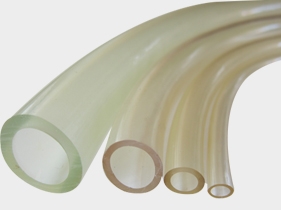
one Harbin Oil resistant hose When using, the talcum powder on the inner wall of the hose must be blown clean to prevent the channel of the welding torch from being blocked. Avoid external extrusion and mechanical damage during use, and do not fold the pipe body. 2. Care must be taken when storing and using the hose to keep it clean and free from damage. For example, avoid exposure to sunlight, rain and snow, and prevent contact with acids, alkalis, oils and other organic solvents that can damage the hose. The storage temperature shall be - 15~40 ℃, and the distance from the heat source shall not be less than 1m. 3. According to the national standards, the oxygen hose is red, the working pressure vessel is 1.5MPa, the inner diameter of the hose is 8mm, and the outer diameter is 18mm; The acetylene hose is black, the working pressure vessel is 0.3MPa, the inner diameter of the hose is 8mm, and the outer diameter is 16mm. 4. The gas cutting operation requires a large oxygen output, so the valves of the gas cylinder (or oxygen pipeline) connected to the high pressure end of the oxygen meter should be fully opened to ensure adequate flow and stable pressure. The low pressure gauge has indicated the working pressure, but the pressure drops suddenly when using oxygen. At this time, it is easy to backfire and may backfire into the oxygen hose to cause explosion. 5. Oxygen hose and acetylene hose shall not be mixed or substituted with each other, and oxygen and hose shall not be used to blow away the blockage of acetylene hose. At the same time, it is necessary to check and eliminate the defects such as gas leakage and blockage of the welding torch at any time to prevent the formation of oxygen and acetylene mixture in the hose. It should be pointed out that the hose color specified in the national standard is opposite to that specified in the international standard (ISO) (oxygen hose is black, acetylene hose is red). At the same time, it is different from the original ministerial standard (HG4-605-66) that oxygen hose is red and acetylene hose is green. Before 1966, domestic oxygen hose was black or green and acetylene hose was red. thus Oil resistant hose Where can I find it? It causes inconsistency between the understanding and habits of the supply department and the user, and is easy to cause accidents due to the mixing and substitution of rubber hoses. At present, it should be emphasized that unified understanding and use should be carried out in accordance with the provisions of national standards, and attention should be paid to distinguishing the rubber hoses of imported equipment.
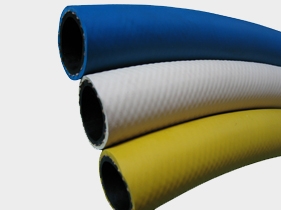
Harbin high quality In places that must be crossed or may rub with the mechanical surface when working, hose clamps or springs and other protective devices should be used to prevent the outer layer of the sandblasting hose from being damaged. Sand blasting hose shall be arranged to avoid heat source as far as possible and away from the performance of engine exhaust pipe. If necessary, sleeve or protective screen can be used to prevent the hose from being heated and deteriorated. When the sand blasting hose must be bent, the bending radius should not be too small, and should be greater than 9 times the outer diameter. There should be a straight line section greater than 2 times the outer diameter of the pipe at the joint between the rubber hose and the joint. How high-quality the products and equipment we use are, it is inevitable that there will be some large and small failures in the process of using them, which will more or less have a certain impact on our work. Just like the use of sandblasting hose, there are traces of its outer adhesive seam, problems must be solved, For this, we explained the following solutions: First, the used water cloth should be used according to the original elastic edge of the water cloth when it is reused. 2: When we wrap the water cloth around the seam of the sandblasting hose, we should apply sufficient and uniform pressure to the pipe body. 3. The water cloth with different widths should be selected according to the size of the outer diameter of the wrapped sandblasting hose (for hose with an outer diameter of less than 30mm, the width of the water cloth should not exceed 90mm). The overlapping width of the water cloth should be 3/5-2/3 of the width of the water cloth.







